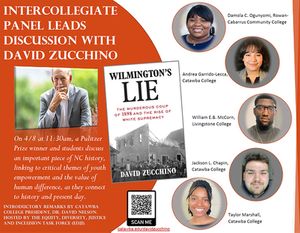
Catawba College will host David Zucchino, Pulitzer Prize-winning journalist and author of the book, Wilmington’s Lie: The Murderous Coup of 1898 and the Rise of White Supremacy, at a student-led panel discussion open to the community. The virtual event will be held on Thursday, April 8, at 11:30 a.m. Panelists include students from Catawba College, Hood Seminary, Livingstone College, and Rowan-Cabarrus Community College.
It will be the first public forum centered on diversity and justice, bringing together all of Salisbury’s local institutions of higher education.
Zucchino calls the 1898 event in Wilmington the only successful coup against an American government in our history. In July 2020, Zucchino wrote in a Time magazine article: “One of the most terrifying examples (of white supremacy and privilege) erupted more than a century ago, when white supremacist soldiers and police helped hunt down and kill at least 60 Black men in Wilmington in 1898. The murders were part of a carefully orchestrated coup that toppled a multi-racial government in North Carolina’s largest city.”
Student panelists will be asking timely and tough questions of Zucchino, questions that draw upon these historical events so as to apply their critical eye to the present political moment. Event organizers, Dr. Mercedes Quesada-Embid, Associate Professor of Environmental Policy and Advocacy, and Dr. Andrew Jacobson, Assistant Professor of GIS and Conservation in Catawba’s Department of the Environment and Sustainability, said that Wilmington’s Lie will allow for a broader platform of discussion surrounding race relations and systemic discrimination, as well as long-awaited institutional empowerment centered on the importance of societal healing. The panelists will aim to cover topics and themes relevant to intergenerational democracy, the role of youth in turning the tides of positive change, and the social capital needed in order to begin to value diversity and seek justice for communities across the country.
The panel discussion is sponsored by Catawba’s Equity, Diversity, Justice and Inclusion Task Force (EDJI). Dr. David Nelson, President of Catawba, will be the host of this first, public, multi-college, diversity-centered, collaborative event in Salisbury.
The event will use the Zoom platform and is open for everyone in the community to join remotely. Attendees may access it live on this page below or on Facebook or YouTube.
Copies of the Wilmington’s Lie book are available at South Main Book Store in Downtown Salisbury. South Main Book Store will also host a book signing with the author after the panel discussion from 4-6 pm.
Zucchino, a contributing writer for The New York Times, has covered wars and civil conflicts in more than three dozen countries. His latest book was a “Best of January” selection at Amazon, a “Book of the Week” at three outlets – Publishers Weekly, the New York Post, and Literary Hub — and a “2020 Title to Watch” at A Literary Journal.
Zucchino’s publisher, Grove Atlantic, writes of the book: “In the 1890s, Wilmington was NC’s largest city and a shining example of a mixed-race community. It was a bustling port city with a burgeoning African American middle class and a Fusionist government of Republicans and Populists that included black aldermen, police officers, and magistrates. There were successful black-owned businesses and an African American newspaper, The Record. But across the state — and the South — white supremacist Democrats were working to reverse the advances made by former slaves and their progeny.
“Zucchino uses contemporary newspaper accounts, diaries, letters and official communications to create a gripping and compelling narrative that weaves together individual stories of hate and fear and brutality,” the publisher writes.
“As part of the coup, white supremacists banished leading Black and white political allies from Wilmington after forcibly evicting them from office and replacing them with coup leaders. Militiamen escorted them to the train station at gunpoint. In the weeks after the coup, more than 2,100 African-Americans fled Wilmington, turning a black-majority city into a white supremacist citadel.
“It was the most successful and lasting coup in American history. It instituted white supremacy as official state policy for half a century and prevented Black citizens from voting in significant numbers until passage of the Voting Rights Act in 1965. Two years before the coup, 126,000 black men registered to vote in North Carolina. Four years after the coup, the number was 6,100. After the coup, no Black citizen served in public office in Wilmington until 1972 and no Black citizen from North Carolina was elected to Congress until 1992. No one was prosecuted or punished for the killings and violence.
Zucchino won the Pulitzer Prize for Feature Writing for his series, “Being Black in South Africa,” in 1989 while writing for The Philadelphia Inquirer. He is also a four-time Pulitzer finalist for coverage of Lebanon, Africa, inner-city Philadelphia, and Iraq. He is the author of two other books, Thunder Run: The Armored Strike to Capture Baghdad, 2004, and Myth of the Welfare Queen, 1997.
He is a graduate of UNC-Chapel Hill, Hussman School of Media and Journalism, and former lecturer at the school. He has been inducted into the North Carolina Media & Journalism Hall of Fame. He worked for the Los Angeles Times for 15 years, focusing on Afghanistan, Iraq and Libya, and The Philadelphia Inquirer for 20 years, as bureau chief in Beirut, Lebanon; Nairobi, Kenya; and Johannesburg. He has also covered the Middle East, Africa, and wars in Chechnya and the former Yugoslavia. He began his career at the Raleigh News & Observer.
